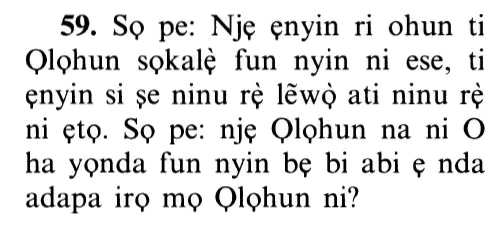10vs59
Select any filter and click on Go! to see results
قُلْ أَرَأَيْتُم مَّا أَنزَلَ اللّهُ لَكُم مِّن رِّزْقٍ فَجَعَلْتُم مِّنْهُ حَرَاماً وَحَلاَلاً قُلْ آللّهُ أَذِنَ لَكُمْ أَمْ عَلَى اللّهِ تَفْتَرُونَ
Qul araaytum ma anzala Allahu lakum min rizqin fajaAAaltum minhu haraman wahalalan qul allahu athina lakum am AAala Allahi taftaroona
Index Terms
Click to play
Yoruba Translation

Hausa Translation
Ka ce: "Shin, kun ga abin da Allah Ya saukar sabõda ku na arziki, sai kuka sanya hukuncin haramci da halacci a gare shi?" Ka ce: "Shin, Allah ne Ya yi muku izni, ko ga Allah kuke ƙirƙirãwar ƙarya?"
Asbabu n-Nuzuul (Occasions of Revelation)
None can make Anything Lawful or Unlawful except Allah or Those Whom Allah has allowed to do so
Allah says;
قُلْ أَرَأَيْتُم مَّا أَنزَلَ اللّهُ لَكُم مِّن رِّزْقٍ فَجَعَلْتُم مِّنْهُ حَرَامًا وَحَلاَلاً قُلْ آللّهُ أَذِنَ لَكُمْ أَمْ عَلَى اللّهِ تَفْتَرُونَ ﴿٥٩﴾
Say: "Tell me, what provision Allah has sent down to you! And you have made of it lawful and unlawful.''
Say: "Has Allah permitted you (to do so), or do you invent a lie against Allah!''
Ibn Abbas, Mujahid, Ad-Dahhak, Qatadah, Abdur-Rahman bin Zayd bin Aslam and others said:
"This Ayah was revealed to criticize the idolators for what they used to make lawful and unlawful. Like the Bahirah, Sa'ibah and Wasilah.''
As Allah said:
وَجَعَلُواْ لِلَّهِ مِمَّا ذَرَأَ مِنَ الْحَرْثِ وَالاٌّنْعَامِ نَصِيباً
And they assign to Allah a share of the tilth and cattle which He has created. (6:136)
Imam Ahmad recorded a narration from Malik bin Nadlah who said,
"I came to Allah's Messenger while in filthy clothes. He said,
هَلْ لَكَ مَالٌ ؟
Do you have wealth?
I answered, `Yes.'
He said,
مِنْ أَيِّ الْمَالِ ؟
what kind of wealth?
I answered, `All kinds; camels, slaves, horses, sheep.'
So he said,
إِذَا آَتَاكَ اللَّهُ مَالًا فَلْيُرَ عَلَيْك
If Allah gives you wealth, then let it be seen on you.
Then he said,
هَلْ تُنْتَجُ إِبْلُكَ صِحَاحًا آذَانُهَا، فَتَعْمِدَ إِلَى مُوسًى فَتَقْطَعَ آذَانَهَا، فَتَقُولُ: هَذِهِ بُحْرٌ، وَتَشُقُّ جُلُودَهَا وَتَقُولُ: هَذِهِ صُرُمٌ، وَتُحَرِّمُهَا عَلَيْكَ وَعَلَى أَهْلِك
It is not that your camels are born with healthy ears, you take a knife and cut them, then say, "This is a Bahr,'' tear its skin, then say, `This is a Sarm,'' and prohibit them for yourself and your family.
I replied, `Yes.' He said,
فَإِنَّ مَا آتَاكَ اللهُ لَكَ حِلٌّ، سَاعِدُ اللهِ أَشَدُّ مِنْ سَاعِدِكَ، وَمُوسَى الله أَحَدُ مِنْ مُوسَاك
What Allah has given you is lawful. Allah's Forearm is stronger than your forearm, and Allah's knife is sharper then your knife.''
And he mentioned the Hadith in its complete form, and the chain for this Hadith is a strong, good chain.
Allah criticized those who make lawful what Allah has made unlawful or vice verse. This is because they are based on mere desires and false opinions that are not supported with evidence or proof.
Allah then warned them with a promise of the Day of Resurrection. He asked:
قال ابن عباس ومجاهد والضحاك وقتادة وعبد الرحمن بن زيد بن أسلم وغيرهم : نزلت إنكارا على المشركين فيما كانوا يحلون ويحرمون من البحائر والسوائب والوصايا كقوله تعالى " وجعلوا لله مما ذرأ من الحرث والأنعام نصيبا " الآيات وقال الإمام أحمد : حدثنا محمد بن جعفر حدثنا شعبة عن أبي إسحق سمعت أبا الأحوص وهو عوف بن مالك بن نضلة يحدث عن أبيه قال : أتيت رسول الله صلي الله عليه وسلم وأنا رث الهيئة فقال " هل لك مال ؟ " قلت نعم . قال " من أي المال " ؟ قال قلت من كل المال من الإبل والرقيق والخيل والغنم فقال " إذا آتاك الله مالا فلير عليك - وقال - هل تنتج إبلك صحاحا آذانها فتعمد إلى موسى فتقطع آذانها فتقول هذه بحر وتشق جلودها وتقول هذه صرم وتحرمها عليك وعلى أهلك " قال نعم قال " فإن ما آتاك الله لك حل ساعد الله أشد من ساعدك وموسى الله أحد من موساك " وذكر تمام الحديث ثم رواه عن سفيان بن عيينة عن أبي الزعراء عمرو بن عمرو عن عمه أبي الأحوص وعن بهز بن أسد عن حماد بن سلمة عن عبد الملك بن عمير عن أبي الأحوص به وهذا حديث جيد قوي الإسناد وقد أنكر الله تعالى على من حرم ما أحل الله أو أحل ما حرم بمجرد الآراء والأهواء التي لا مستند لها ولا دليل عليها ثم توعدهم على ذلك يوم القيامة.
"قل أرأيتم" أخبروني "ما أنزل الله" خلق "لكم من رزق فجعلتم منه حراما وحلالا" كالبحيرة والسائبة والميتة "قل آلله أذن لكم" في ذلك بالتحليل والتحريم لا "أم" بل "على الله تفترون" تكذبون بنسبة ذلك إليه
يخاطب كفار مكة .
I'raab - grammatical analysis of the Qur'an
«قُلْ» أمر وفاعله مستتر والجملة مستأنفة.
«أَرَأَيْتُمْ» الهمزة للاستفهام وماض وفاعله والجملة مقول القول.
«ما» موصولية مفعول به.
«أَنْزَلَ اللَّهُ» ماض ولفظ الجلالة فاعله والجملة صلة.
«لَكُمْ» متعلقان بأنزل.
«مِنْ رِزْقٍ» متعلقان بمحذوف حال.
«فَجَعَلْتُمْ» الفاء عاطفة وماض وفاعله والجملة معطوفة.
«مِنْهُ» متعلقان بجعلتم.
«حَلالًا» مفعول به و«حَراماً» معطوف على حلالا.
«قُلْ» أمر فاعله مستتر والجملة مستأنفة.
«اللَّهُ» لفظ الجلالة مبتدأ والجملة مقول القول.
«أَذِنَ» ماض فاعله مستتر والجملة خبر.
«لَكُمْ» متعلقان بأذن.
«أَمْ» عاطفة.
«عَلَى اللَّهِ» لفظ الجلالة مجرور بعلى متعلقان بتفترون.
«تَفْتَرُونَ» مضارع مرفوع بثبوت النون والواو فاعل والجملة معطوفة.
